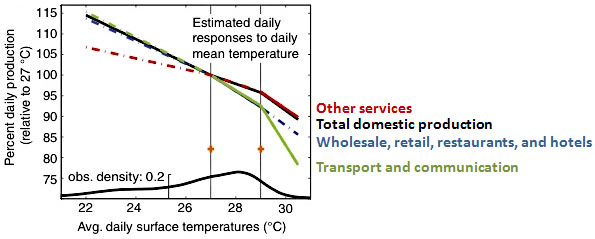People in hot climates don’t work as hard as people in more temperate climates. It’s hot! You get tired more quickly. You need to take more breaks. You don’t get as much done.
This is hardly a new insight. But it turns out you can measure how much less people work when the temperature goes up. And the answer is: about 2% less for every extra degree Celsius (see chart below). A recent natural experiment confirmed this, when the Japanese government asked businesses to use less air conditioning after the Fukushima earthquake and tsunami. Productivity decreased at just about the predicted rate.
But earthquakes and equatorial latitudes aren’t the only things that raise temperatures. Global warming does it too. So what does that mean for worker productivity in the future? Solomon Hsiang, a sustainable development post-doc at Princeton, explains:
In my 2010 PNAS paper, I found that labor-intensive sectors of national economies decreased output by roughly 2.4% per degree C and argued that this looked suspiously like it came from reductions in worker output.
[From a later post] Reductions in worker output have never been included in economic models of future warming [] despite the fact that experiments fifty years ago showed that temperature has a strong impact on worker output []. In my dissertation I did some back-of-the-envelope estimates using the above numbers and found that productivity impacts alone might reduce per capita output by ~9% in 2080-2099 (in the absence of strong adaptation). This cost exceeds the combined cost of all other projected economic losses combined.
Of course, maybe robots will be doing all our work for us by then. But maybe not. It’s yet another reason — in addition to famines, drought, drowned cities, and the death of millions — to think that turning the entire world into a tropical zone might not be such a great idea.
Via Andrew Gelman at The Monkey Cage.


















